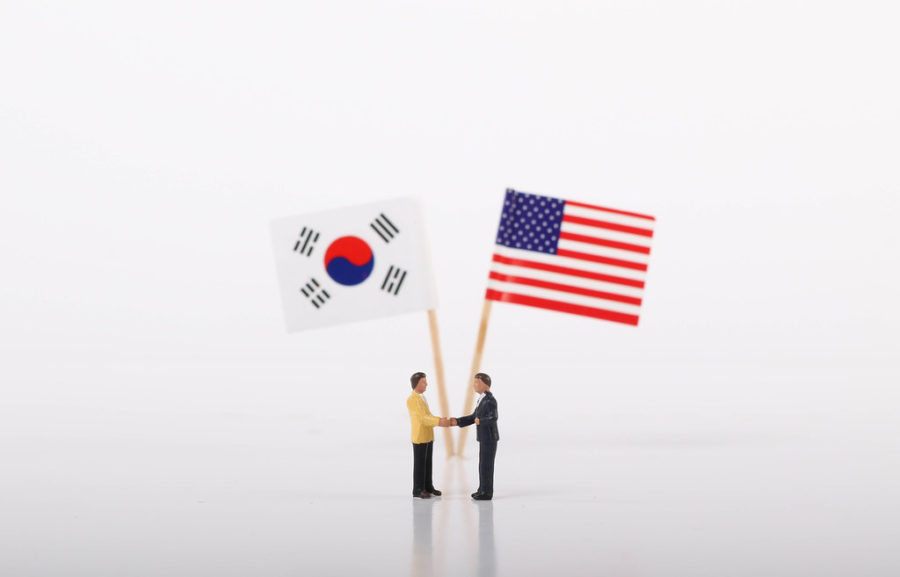U.S.-South Korea Summit Opens a New Chapter in Partnership and Cooperation
June 4, 2021
Since 1953, when the armistice of the Korean War was signed, the United States and South Korea maintained an intimate and constructive relationship to counter the continuous threats posed by North Korea. Throughout the past few years, the United States and South Korea experienced diplomatic conflicts regarding the policies of preventing North Korean human rights abuse and the development of nuclear weapons and missiles. Despite this, on May 21st, a successful summit between the U.S. President Joe Biden and South Korean President Moon Jae-in was held in the White House. Both presidents have once again recognized the solidity of the profound friendship between the two nations and discussed various methods to promote further political and economic cooperation. A number of mutually beneficial steps toward progress were made throughout the summit, along with a symbolic event that honored the veterans who valiantly fought for the two countries.
Among the numerous achievements made through the summit, cooperation between South Korea and the United States with regard to economy, vaccines, and military forces were particularly outstanding. Four of the largest industrial conglomerates of South Korea—which include Samsung, LG, Hyundai, and SK—have announced that they will initiate their plans to invest $40 billion in the United States. It is expected that the investment will lead to the creation of thousands of high-quality jobs for Americans. In return, president Biden provided South Korea with 550,000 COVID-19 vaccines for the Korean military in addition to an existing contract for 40 million doses of Pfizer vaccine, which would greatly improve South Korea’s ability to combat COVID-19. Furthermore, the United States removed the South Korea Ballistic Missile Range Guidelines, which was created to relieve the tension in the Korean Peninsula following the Korean War and deaths caused by military conflicts in 1979. These guidelines have limited South Korea’s ability to develop long-range ballistic missiles for the past 42 years, but starting May 21, South Korea can develop ballistic missiles with unlimited range.
The two presidents also acknowledged the human rights abuse committed by the North Korean regime and underscored the significance of cooperation among the United States, Japan, and South Korea in East Asia. According to the U.S.-ROK Leaders’ Joint Statement published by the White House, the primary purpose of this trilateral cooperation is to protect “shared security and prosperity, upholding common values, and bolstering the rules-based order” to prevent North Korea’s unpredictable and threatening provocations such as Ballistic missile tests. They have also demonstrated that they share the values of establishing peace and democracy. The two leaders believe that strengthening the alliances would contribute to establishing stability throughout the Asian-Pacific region.
There was also a ceremony that revealed the two leaders’ gratitude for the veterans who served during the Korean War. Colonel Ralph Puckett Jr, a 94-year-old veteran of the Korean War, was awarded the United States military’s highest honor by President Biden. Honoring 94 years old Korean war veteran Colonel Ralph Puckett Jr by awarding him the military’s highest honor. “Today we are hosting a true American hero and awarding an honor that is long overdue — more than 70 years overdue,” said Biden. President Moon also acknowledged the contribution of the valiant American veterans to the development of freedom, democracy, and economic prosperity that South Korea has achieved throughout the past few decades. “Without the sacrifice of veterans, including Colonel Puckett and the Eighth Army Ranger Company, the freedom and democracy we enjoy today couldn’t have blossomed in Korea,” said Moon.
On May 31, the North Korean government released its first official response towards the U.S-South Korea summit through its state media KCNA (Korean Central News Agency). As expected, it criticized the United States for agreeing to abolish the Ballistic Missile Guidelines claiming that it would potentially trigger a missile arms race between South and North Korea. It has also claimed that the recent agreements serve as a “stark reminder of the U.S. hostile policy toward the DPRK (North Korea) and its shameful double-dealing.” However, many South Koreans have positive views regarding the results of the recent summit, which is reflected in the substantial increase in President Moon’s approval ratings. It would be important for both countries to maintain the tight alliance based on the values of freedom, democracy, and prosperity especially throughout the combat against threats of Covid-19 and North Korean military provocations.


















































































































































